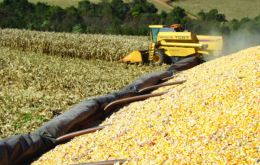MercoPress. South Atlantic News Agency
Economy
-
Wednesday, June 23rd 2010 - 03:13 UTC
General Motors South America is born to cater rising demand in the region

General Motors is setting up a new regional organization in response to rising demand in South America. The new unit, GM South America, will be headquartered in Sao Paulo, Brazil.
-
Tuesday, June 22nd 2010 - 05:05 UTC
Brazil reacts cautiously to the Yuan “greater flexibility” policy

Brazil's Central Bank welcomed China's move to boost flexibility of the Yuan exchange rate, saying the decision showed China's willingness to help the global economy.
-
Tuesday, June 22nd 2010 - 04:54 UTC
G20 leaders (mainly US and Europe) seem divided stimuli timing withdrawal

President Barack Obama has warned against cutting national debts too quickly as it would put economic recovery at risk. In a letter to G20 leaders, the US president said that while it was important to put in place “credible plans” to cut deficits, withdrawing economic stimulus early was dangerous.
-
Tuesday, June 22nd 2010 - 04:52 UTC
Risk rating agency says low risk of a Euro zone breakup; praises Stabilization Mechanism

Although the sovereign debt crisis has revealed weaknesses in several European Union countries, the risk of a Euro zone breakup is low over the shorter term, Fitch Ratings said on Monday.
-
Saturday, June 19th 2010 - 02:11 UTC
BRIC emerging economies will enjoy agriculture boom, says UN-OECD report

The emerging economies of Brazil, India, China and Russia (BRIC) will enjoy an agricultural boom over the next decade as production stalls in Western Europe, a report says.
-
Friday, June 18th 2010 - 20:29 UTC
IMF chief Strauss-Khan strongly supports Spain’s reforms

IMF Managing Director Dominique Strauss-Kahn praised Spain’s management of the current economic situation and said the budget deficit will shrink “rapidly” as the government’s overhaul of labor rules boosts economic growth.
-
Friday, June 18th 2010 - 19:28 UTC
World Bank calls for stronger Yuan to reduce inflation and spur domestic demand

World Bank has reiterated its view that the Chinese government should allow the Yuan to strengthen against other international currencies. The bank also forecasted the Chinese economy would grow 9.5% in 2010 and 8.5% in 2011.
-
Friday, June 18th 2010 - 05:46 UTC
What went wrong with the Euro? It was like some kind of sleeping pill

EU president Herman Van Rompuy blamed the past strength of the European single currency for making the Euro zone unaware of its fiscal problems, in an interview with the Financial Times.
-
Friday, June 18th 2010 - 05:43 UTC
Venezuela’s CITGO offering to pay 12% for a 7 year bond

US based CITGO Petroleum Corporation, a wholly owned subsidiary of Venezuela's state oil company Petroleos de Venezuela S.A. (PDVSA), is coming to market with a 7 year bond and offering to pay 11.75% to 12% on the debt.
-
Friday, June 18th 2010 - 04:29 UTC
China wants higher pay for workers; spate of strikes in foreign owned companies

One of China's most influential newspapers, the official People's Daily, has called for workers' incomes to be raised. The paper says wages need to rise to protect stability and transform society.
